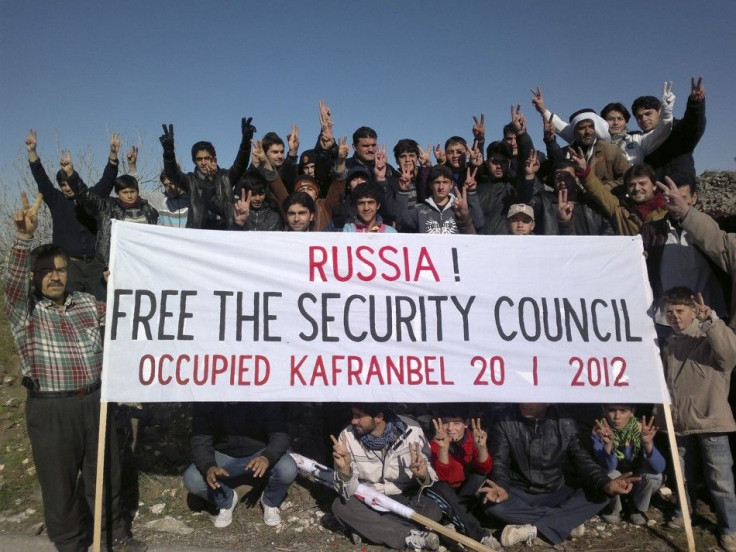Russia Warns of 'Scandal' in Vote at U.N. on Syria

Russia sought to delay a U.N. Security Council vote on a resolution aimed at ending the bloodshed in Syria, warning on Saturday of a so-called scandal should the current draft be put to council members, the Itar-Tass news agency reported.
Foreign Minister Sergei Lavrov's remarks, which Itar-Tass said came in an interview to be aired on state-run Rossiya-1 television, indicated Russia would likely veto the resolution unless its latest proposed amendments are taken into account.
If they want another scandal for themselves in the Security Council, then we probably cannot stop them, Lavrov said, according to Itar-Tass. Rossiya-1 said the interview was recorded early on Saturday.
Lavrov said he hoped the draft -- scheduled to be put to a vote at 10 a.m. EST (1500 GMT) on Saturday -- would not come to a vote without changes because our amendments to this draft are well-known.
I sent them to [U.S. Secretary of State] Hillary Clinton yesterday, and to our representative at the United Nations to convey them to our partners, Lavrov was quoted as saying. The reasonableness and objectivity of these amendments should not raise any doubts. I hope that a prejudiced view does not prevail over common sense.
Activists said on Saturday that more than 200 people had been killed in shelling by Syrian forces in the city of Homs, ahead the U.N. vote.
In the remarks reported by Itar-Tass, Lavrov gave no detail about the proposed changes in the resolution, which gives full support to an Arab League plan that calls for Syrian President Bashar al-Assad to cede power.
Western and Arab nations that have pushed for Assad to give up power after an 11-month government crackdown that the United Nations says has led to more than 5,000 deaths are struggling to overcome Russian resistance to Security Council action.
Revised
They revised a draft resolution first circulated last month to deal with Russia's concerns, adding some language it wanted and removing sections that Moscow had suggested would prompt it to use its veto power as a permanent council member.
The latest draft, circulated by Morocco on Thursday, makes no specific mention of what the Arab League plan to end the bloodshed entails, such as Assad giving up power.
However, it still fully supports the plan, which Russia has complained contains too many specifics that could predetermine the outcome of a settlement dialogue between the government and its opponents.
Russia has said political decisions such as a transfer of power must be made only as a result of dialogue inside Syria, not set in advance from outside.
It has also said previous Western drafts put too much blame for the bloodshed on the government, while Russia says militant opponents of Assad are behind much of the violence.
Assad's government has given post-Soviet Russia its firmest foothold in the Middle East, buying Russian weapons and hosting a naval-maintenance facility on its Mediterranean coast that is Russia's only military base outside the former Soviet Union.
Russia and China vetoed a European-drafted resolution on Syria in October, with the Kremlin saying it put too little blame on Assad's opponents and could have opened the way to Western military intervention.
Russia allowed a Security Council resolution authorizing air strikes on Libya by abstaining in a vote last year and then accused the United States and its NATO allies of overstepping its bounds and using it to help rebels oust Moammar Gadhafi.
(Writing by Steve Gutterman)
© Copyright Thomson Reuters {{Year}}. All rights reserved.






















